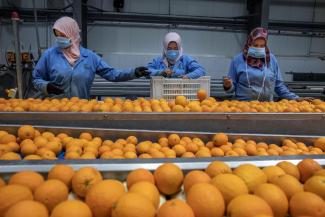International trade
Embedding social standards

In terms of helping affected economies to bounce back, the top priority is to restore trade flows. Trade must be facilitated, and it must be organised in ways that ensure that hygiene standards are observed. Information Technology can help – consider electronic payments, for example.
Trade financing is needed too. One problem is that the banks that finance the bulk of trade are curtailing credit in view of higher risks. Limited access to credit is thus a serious challenge, especially for small and mid-sized enterprises.
Rethinking the role of trade in economic development must now top the agenda of policymakers. The double crisis which affects both public health and economic growth requires every country to balance openness and protection in a new way. For decades, “industrial policy” was a taboo phrase, but now it is being proposed as an appropriate approach to avoid overdependence on foreign suppliers – and especially if all those suppliers are Chinese.
In future, trade rules must give more scope to industrial policies. So far, trade agreements have banned or severely restricted related instruments. In this respect, the World Trade Organization’s Agreement on Trade Related Investment Measures (TRIMS) or the one on Trade Related Intellectual Property Rights (TRIPS) are typical. WTO members must reconsider those restrictions. We need to do a better job of balancing private interests with the common good.
The mantra of development resulting simply from a country’s companies’ integration into global supply chains has become obsolete. Cross-border production has been in decline since the global financial crisis of 2008. In future, each country will have to balance domestic production with integration into regional or global value chains in the way it deems best. African countries, in particular, should focus more on regional rather than global integration. The pan-African free trade area is an important long-term goal, and it can best be achieved through fostering ties within existing African regional organisations.
Trade agreements should be redesigned with a view to achieving the UN Sustainable Development Goals (SDGs). Countries with strong social-safety nets have so far coped better with the Covid-19 crisis. Trade agreements must therefore do more to safeguard and promote social-protection standards. As a first step, the EU should strengthen the so-called sustainability chapters in its bilateral agreements. Ultimately, social and environmental issues have to be streamlined in the multilateral trade regime.
Trade policy, moreover, must take the climate crisis into account. This would strengthen local and regional production. That goods cross multiple borders during production processes results from the social costs of such transportation – including harm to the environment and health – are not considered. In future, market prices must reflect such external costs. A border levy on imported products, reflecting the carbon emitted in the production process, would serve that purpose. It would essentially be a tax on “dirty” goods.
A global agreement embedding social and environmental standards in the international trade regime would be the ideal long-term solution, but that is a long way off. The EU should take an easier step first. It should abolish customs duties on all goods that developing countries produce in sustainable ways. That would be a sensible measure in the EU’s ongoing reform of its Generalised System of Preferences.
The Corona crisis is a burden on humanity. The least we can do is learn its lessons.
Evita Schmieg is a scholar at the Europe Research Group of the Stiftung Wissenschaft und Politik (SWP – the German Institute for International and Security Affairs).
evita.schmieg@yahoo.de











